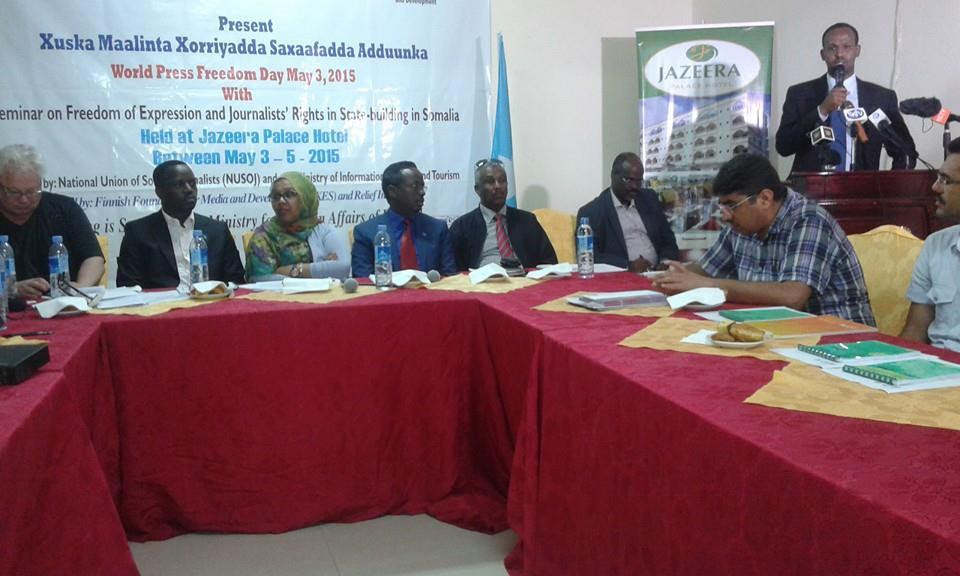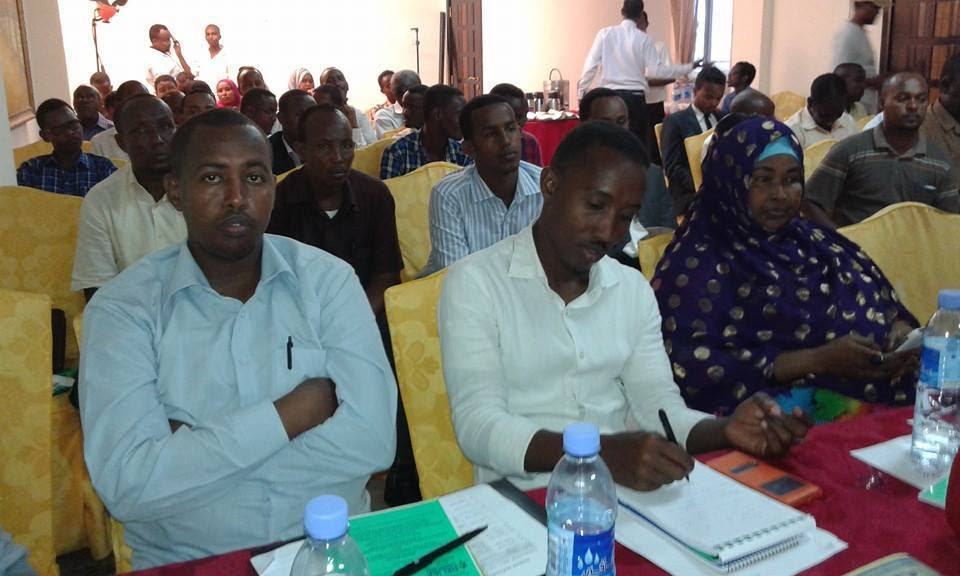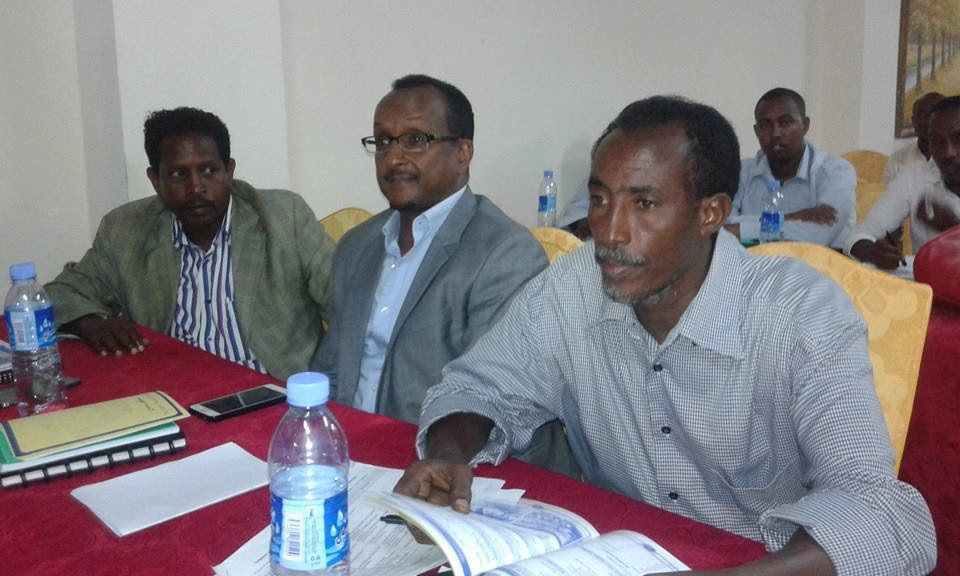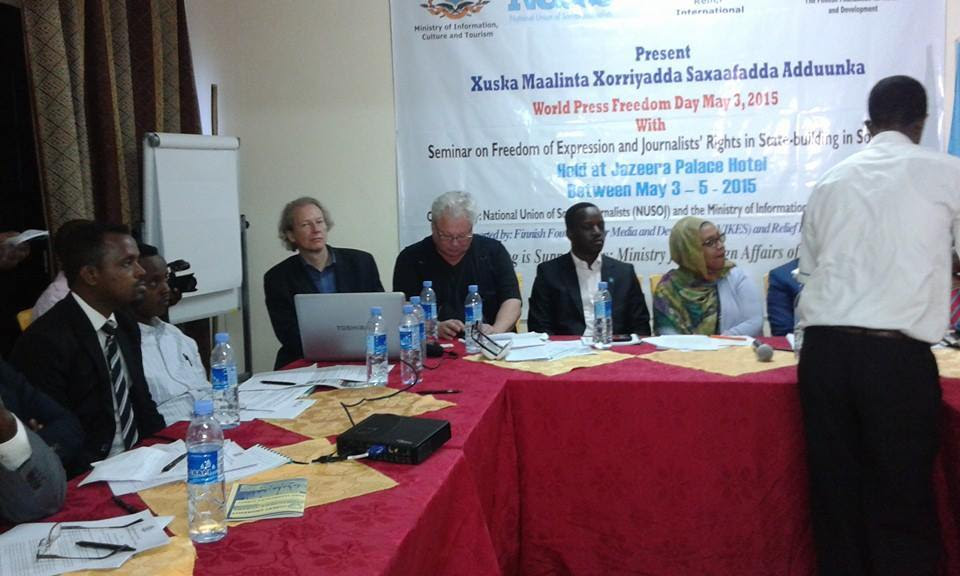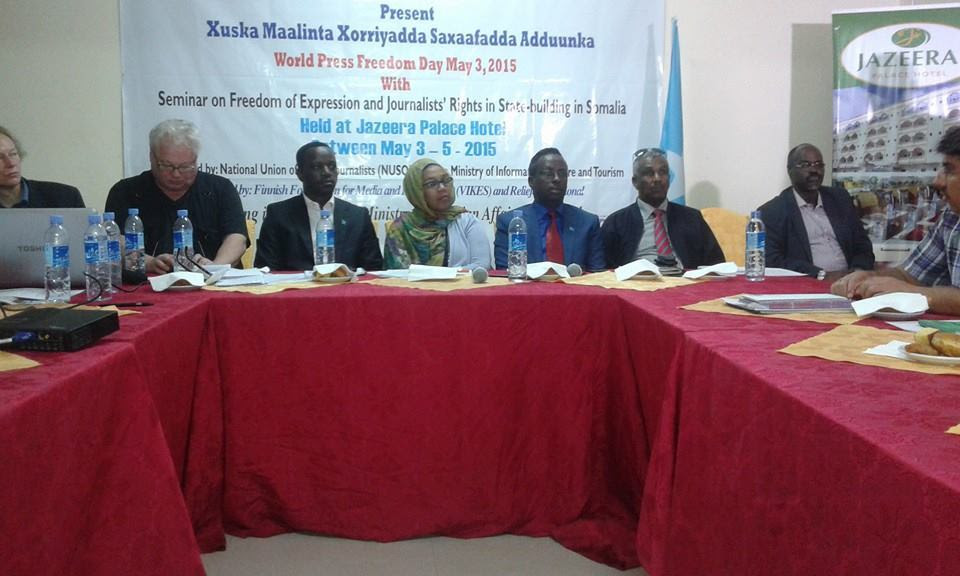Distinguished participants, Ladies & Gentlemen, A Salaamu Aleykum Warahmatullah Wa Barakaat.
It is a great honor for me to attend this very important Seminar on Freedom of Expression and Journalists’ Rights in State-Building in Somalia. Today has tow occasions, one is for the 3rd of May, the World Press Freedom Day and second is the 3 days workshop facilitated by Finland.
Let me send my congratulations to all media practitioners in Somalia and around the world on this important occasion. Their bravery is what makes the world peace and harmony.
I would like to thank the Government of Finland, the great friends of the Ministry of Information, and those organized this important workshop, such as the Ministry of Information, VIKES, Relief International and NUSOJ, in particular our friends from Finland who came all the way from Finland.
Before I make my remarks for the occasion as a Minister of Information, first let us look back the current situation in Somalia, as the world views Somalia as a ghost place, a place for civil war, terrorism, piracy, young people fleeing from the country and so on. If I summarize it, Somalia is now very peaceful, there are progress in every level such as building institutions, improved security, success on defeating terrorists, economic boom, service delivery and after all thee are lots of investment opportunities that exist.
Ladies & Gentlemen, we are all aware the importance of the 3rd May, as press freedom is the basic necessity of the human being, and we all know that where there is no freedom of expression there are no living people. I am very pleased to report to you that our provisional constitution gives guarantees of freedom of expression to our citizens. The policy of the Federal Government and the Ministry of Information is that there are no progress in the country until we have a sound press freedom.
Ladies & Gentlemen, let me highlight some of the progresses on Somali media, as well as challenges, I can summarize it as follows:
1. Media development in Somalia
In Somalia we have an open competition and a thriving media, which is growing speedily by the day across the country, the continent and the world at large. These thriving industry include radios, TVs, websites, social media, digital outreach and newspapers. Mogadishu alone we have over 30 FM radios, 8 TVs and 8 satellite TVs and 100s of news websites.
We also have State media such as National TV and Radio Mogadishu and they are part of the overall media that has an open competition. Somali National TV is watched around the globe through satellite and a recent survey showed that SNTV is the most watched and listened Somali TV. Most of FM radio stations are located on most of regions, in particular cities with sizeable people. We also have in the state media, websites, SONNA and social media with a view to reach out to communities.
1. Challenges faced Somali Media.
2.1. Killings of Journalists by Al-Shabaab
Since the Federal Government is winning the war against terrorist by recapturing most of cities that they used to occupy, the terrorists have changed their tactics to an asymmetric warfare by planting roadside bombings and suicide bombings to civilians. Their aim is to terrorize people so that they can continue their atrocities. As a result fo this, they usually target journalists in order to get a headline coverage of the day’s news. The Federal Government has successfully captured some of these attackers and took them to courts. Some have already faced public punishment, in order to reduce of stop the killing of journalists.
I would like to take this opportunity to send out our condolences to the families, friends and loved ones that was killed while they were on duty.
2.2. Shortage of skills
In Somalia we have young people that are very brave and enjoy being a journalists by taking huge risks. We always encourage and appreciate their role which is important to provide accurate information to people. However, their shortage of skills, sometimes they don’t prioritize the important news for the community at large and more importantly to speak on behalf of vulnerable groups, instead they prioritize on airing issues of national security, such as giving airtimes to terrorists, which prevents them to provide an accurate information to the people while upholding ethical journalism. The Federal Government has plans to provide all journalists appropriate trainings to up-lift their skills, knowledge and quality of reporting.
2.3. Lack of salaries
We fully understand the dire need situation that our journalists’ work, as most of media outlets cannot afford to provide salaries to their staff. In order to overcome this problem the Federal Government prepared media law, which clearly gives huge responsibilities for media owners to provide salaries to their staff. Therefore, we ask our friends and allies to provide the necessary supports to Somali media.
2.4 Shortage of equipment
Somali media as a whole, lack the necessary equipment that they so desperately in need to function, whether its private or public media. I would like to thank once again the government of Finland, and in particular VIKES, that recently provided equipment to SNTV studio, and we would like others to follow suit. Therefore, I ask all our partners to provide all necessary equipment to Somali media in order for them to function properly.
3. Ministry of Information’s plans on the above challenge
a) To provide security to all
In order to develop Somali media, it is important that we provide peace and stability in Somalia. And that is why the Federal Government of Somalia prioritizes security. The Stabilizaiton process is going very well, as we want every district to have security institutions and law enforcement agencies. As part of the stabilization process security institutions work with communities in order to build the confidence of the people.
b) Somali Media Law
The Ministry of Information prepared Media Law, which is in the parliament for debate and approval. The Ministry widely consulted with all key stakeholders in Somalia including private media, media organization, international NGOs on media, civil society groups, regions and all segments of the society before tabling the media law to the cabinet that approved September last year. We have also consulted with our international partners and the media law is an international standard. Once the media law is approved by the parliament and the President signs the decree, we will be in a position to implement it. We will establish Somali Media Council that consists of private media, civil society groups and government officials. The Council will deal with all complaints relating to media issues, and to ensure that media operates ethically and responsibly. We will also establish for the first time in Somalia Public Service Broadcaster. Therefore, in order to implement all the above, we would need the support and the assistance from our partners, as these issues are very important to the development of media.
c) Somali Journalists’ Academy
In order to enhance the capacity of our journalists, the Ministry of Information plans to establish Somali Journalists’ Academy, which we strongly believe will build the capacity, the skills, the knowledge and the experience of our journalists. At the same time the academy will attract new recruits of journalists to gain the necessary skills and knowledge before starting journalism in Somalia.
d) To prepare the strategy to develop Somali Media
Ministry of Information strongly believes that it is the right time to prepare the strategy to develop Somali Media. It is important to conduct wide consultation to all key stakeholders in Somalia. Therefore, the Ministry of Information plans to hold seminar to prepare the stragey. Participants of the seminar include officials from the Federal Government and regional Ministries of Information, regions, civil society groups, NUSOJ and all concerned parties including international NGOs and experts so that it can be devised a 5 year plan and strategy to the development of Somali media. The strategy will help us to coordinate better, to streamline all our efforts in order to reduce dublications. However, the Ministry of Information has no budget on this, therefore, we kindly ask our partners and friends to work with us so that we can prepare the 5 year plan and strategy that we are so desperately in need.
Finally, I would like to encourage and appreciate all their work on all government, international partners and agencies that support Somali media. In order for us to implement all the above issues, we would urgently need your support on capacity building; journalists’ equipment, incentives and we need to look after our brave journalists.
I hope that the workshop and the three days debate will provide you a fruitful discussion that can really make huge changes to the development of Somali media.
Thank You


